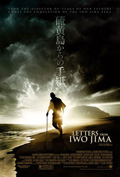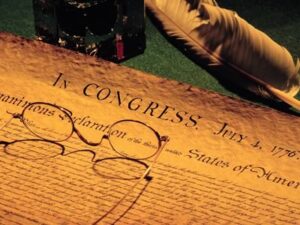Righteous indignation on each side; blustery public diatribes backed by legal or biblical authority; verbal wars among foes and friends and family which take no idealogical prisoners—this seems to be the state of current events.
But this tiny spider doesn’t seem to know, or care. She’s not angry, or justified, or changing the color of her web to the rainbow.1 She doesn’t notice at all. The sun came up, she made her web, she’ll eat if bugs show up, and the sun will go down again when the day is through.

Yet we struggle, we fight, we vehemently beat back opposing views.
Views. That’s what we’re fighting. Views. Opinions. Beliefs.
I am a person. I have my own views. I do not think it’s wise to equate the marriage between a man and woman with one between two people of the same gender. I do not think it needs to be illegal, but to me—my belief, my opinion, how I would choose—it would be wiser to proceed as God designed us to be.
(Please note: in this post, I’m not going to address any “how we are made” thoughts other than the obvious reproductive gender differences which I am referencing above. Of course there are so many other mental/emotional/chemical/physical factors.)
Since God has said that it is unnatural for a man to have sex with a man, or a woman to have sex with a woman;2 well, I believe him. He also said he hates divorce; so I plan to never choose that, no matter how much “sense” it might seem to make at some future time, or how much I might want it (to be clear, I do not want it now). He also said adultery is wrong, no matter how much it might seem like a good idea, or we might want it. Sex is for marriage, between one woman and one man—that is God’s best design. (And nothing else.)
It is not our place to condemn sin. (As Romans 2 says, then you’re just condemning yourself, too.) Sin is anything which takes the place of our reliance upon our Father. It’s often a counterfeit of the good he wants to give us. Sex is great, of course, in the context above. But every other form will harm us, or somehow harm our relationship with God, who is our Life.
It is not just homosexual sex, nor any other “great sin” our friends on the conservative right rail against which is sin. Nor is it neglect of the poor, or greed, or religious bigotry against which our more liberal friends crusade. There is so much sin. None of us is free from it, or immune from it. None of us has never sinned.
(Sidebar: if you have never read John 8, please take a moment to read it now. So enlightening.)
Now that I’ve shared my opinion on the matter, do you think I hate anyone wanting to marry someone of their own gender? Do you hate me for thinking that is not what God intended for them?
Of course I do not.
I do not hate anyone. Really. I don’t. I think I might be labeled as hating, though, because I believe some things (behaviors) are harmful, and wrong. (I think drinking pop is harmful and wrong… so maybe I’m not a good test case?)3
Difference of beliefs is not hate. It’s really, really not.
But let’s wrap this up with a return to my new friend, the spider.
As I ate my lunch, thoughts of all the discord and self-righteous banter, Facebook photos and links swirled through my mind. In that mental maelstrom, I felt noticeable peace. (Despite the noise of the traffic which passes our house most hours of the days.) I saw that very tiny spider, quiet and still on her web, swaying with the gentle breeze. I could imagine her saying, had she the voice, “What’s all the fuss about?”
I’m not saying these things aren’t important, but they are not worth a war of words. Certainly they do not justify hate in return for perceived hate. If someone thinks differently than you (so long as they are not actually harming another) then just let them. Just let them.
The world will go on. Until Jesus returns, there will be harm and good, pain and joy. Both coexist together.
I think the spider would say that we should, too.
- It is ironic, though, is it not, that there are rainbow-colored pinwheels in the background. 🙂 ↩
- Read Romans 1-2, especially Romans 2 if you are a Christian reading this. ↩
- One more sidebar: I am currently reading a very interesting history of the Confederacy. The Story of the Confederacy was written in 1931 by Robert Selph Henry. Should I burn this literary work? It is not condemning the Confederate flag, nor its people. Rather, the author is hoping to present both sides of the story in our country’s history. It’s important. Does my interest in this mean I hate black people? ↩




 I’ve mentioned here many times that I am learning how crucial it is to see life from multiple angles. Getting not only information from people with opposing viewpoints, but really trying to step into their shoes; see from their perspective. It’s just so crucial to communication, to cooperation, interaction… to society in general.
I’ve mentioned here many times that I am learning how crucial it is to see life from multiple angles. Getting not only information from people with opposing viewpoints, but really trying to step into their shoes; see from their perspective. It’s just so crucial to communication, to cooperation, interaction… to society in general. Today—right now, in fact, at 5:13pm ET—I am celebrating ten years of writing for this blog.
Today—right now, in fact, at 5:13pm ET—I am celebrating ten years of writing for this blog. I had a run-in with the law this week.
I had a run-in with the law this week. I walked next door to the Village Clerk’s office, which was then being manned (womanned?) by a friend of ours. She had heard of the alleged infraction, and knew of the license requirement, but like the officer and myself, shook her head at the enforcement of it in the case of a teenager’s lemonade stand.
I walked next door to the Village Clerk’s office, which was then being manned (womanned?) by a friend of ours. She had heard of the alleged infraction, and knew of the license requirement, but like the officer and myself, shook her head at the enforcement of it in the case of a teenager’s lemonade stand. If this worked for the Israelites (and it was God’s idea in the first place) then why wouldn’t it work for us, too?
If this worked for the Israelites (and it was God’s idea in the first place) then why wouldn’t it work for us, too? Deep under the flourishing leaves, and the towers branches, and the succulent fruits which garner all the deserved and proper attention, are the roots.
Deep under the flourishing leaves, and the towers branches, and the succulent fruits which garner all the deserved and proper attention, are the roots.

 The next thing we noticed was about a quarter (or maybe a half?) of the group were smoking cigarettes. There’s nothing definitely wrong with smoking cigarettes, but it just looked kind of funny with all of the formal wear and fancy-looking people. And, as we got closer to them, it smelled pretty bad, too. So, we kept our distance from the raucous crowd.
The next thing we noticed was about a quarter (or maybe a half?) of the group were smoking cigarettes. There’s nothing definitely wrong with smoking cigarettes, but it just looked kind of funny with all of the formal wear and fancy-looking people. And, as we got closer to them, it smelled pretty bad, too. So, we kept our distance from the raucous crowd.

 It’s hard to appreciate independence as an American in the 21st century.
It’s hard to appreciate independence as an American in the 21st century.